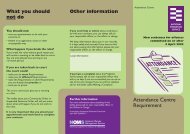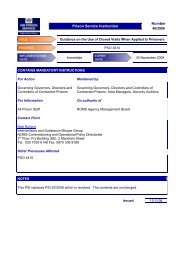Resettlement provision for children and young ... - Ministry of Justice
Resettlement provision for children and young ... - Ministry of Justice
Resettlement provision for children and young ... - Ministry of Justice
You also want an ePaper? Increase the reach of your titles
YUMPU automatically turns print PDFs into web optimized ePapers that Google loves.
However, there was also a worrying example where a <strong>young</strong> person who had been in his<br />
establishment <strong>for</strong> two months said:<br />
‘I’ve not had any DTO reviews [training planning meetings], not seen my YOT. My<br />
YOT case manager left be<strong>for</strong>e I came in – they were supposed to replace them but<br />
I’ve not heard anything.’<br />
4.34 Outside <strong>of</strong> training planning meetings, the level <strong>of</strong> engagement between case supervisors <strong>and</strong><br />
YOT case managers throughout a <strong>young</strong> person’s time in custody varied, from daily contact<br />
between some to no contact between others. Case supervisors said that they would generally<br />
contact YOT case managers if there had been an incident or problem with the <strong>young</strong> person<br />
between meetings, but that they would mostly contact YOT case managers to keep up to date<br />
with plans <strong>for</strong> release, including accommodation <strong>and</strong> ETE plans. Although case supervisors<br />
said that plans were <strong>of</strong>ten not confirmed until near to the end <strong>of</strong> the sentence, they were<br />
generally positive about YOT case managers’ contribution in review meetings <strong>and</strong> felt that<br />
resettlement plans were discussed openly <strong>and</strong> realistically with the <strong>young</strong> person. In our survey<br />
87% <strong>of</strong> <strong>young</strong> men reported that their YOT case manager had been in touch since they had<br />
arrived at their current establishment, <strong>and</strong> 62% said they knew how to get in touch with their<br />
YOT case manager if they wanted to.<br />
4.35 There were also examples <strong>of</strong> specialist YOT workers (such as those specialising in<br />
accommodation, education or careers; see Table 2) attending training planning meetings. IRS<br />
workers had attended at least one meeting <strong>for</strong> 10 <strong>young</strong> people (17%) in our sample. However,<br />
it was not always clear from the paperwork if a specialist YOT worker had attended as they<br />
were sometimes just noted as ‘YOT’. Interviews with heads <strong>of</strong> learning <strong>and</strong> skills said that<br />
education staff did not always have links with the specialist YOT education workers <strong>and</strong>, where<br />
there were links, these were because the case supervisors, Connexions personal advisors or<br />
resettlement brokers had established them.<br />
Family or carers<br />
4.36 Many <strong>young</strong> people return to live with their families or carers on release, <strong>and</strong> even if they do<br />
not, families/carers can <strong>of</strong>ten play a key role in supporting <strong>young</strong> people in custody <strong>and</strong> on<br />
release, where appropriate. However it was not clear whether families <strong>and</strong> carers always<br />
received invitations to initial training planning meetings. The majority <strong>of</strong> establishments told us<br />
they left it to the YOT case manager to invite families/carers to initial meetings <strong>and</strong> <strong>of</strong>ten this<br />
relied on the case manager’s more detailed knowledge <strong>of</strong> the <strong>young</strong> person <strong>and</strong> their<br />
circumstances. However, attendance by families/carers at initial meetings was inconsistent,<br />
even though this was when targets should have been agreed <strong>and</strong> plans <strong>for</strong> release first<br />
discussed. Where families/carers did not attend the initial meeting, case supervisors said they<br />
<strong>of</strong>ten took on the responsibility <strong>for</strong> inviting them to subsequent meetings. For our sample,<br />
families/carers were generally invited to these meetings, although case supervisors <strong>and</strong> <strong>young</strong><br />
people said they could not always attend due to the distance involved or the timing <strong>of</strong> the<br />
meeting. Although figures on the attendance <strong>of</strong> families/carers were not collected, case<br />
supervisors across the establishments reported that overall attendance by families/carers at<br />
review meetings was only 40–50%. In our case sample, family/carers had attended at least<br />
one training planning meeting <strong>for</strong> 52% (n=31) <strong>of</strong> <strong>young</strong> people, but a family support worker or a<br />
family liaison <strong>of</strong>ficer, whose role it was to support <strong>and</strong> develop family relationships, had only<br />
attended four <strong>young</strong> people’s meetings (7%).<br />
37

















